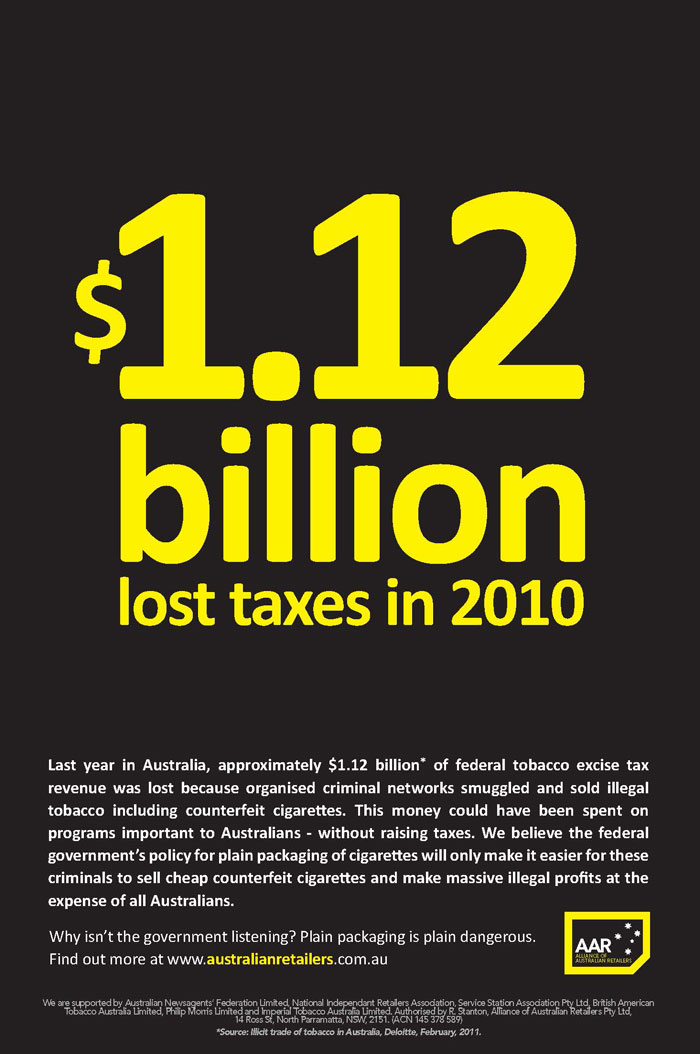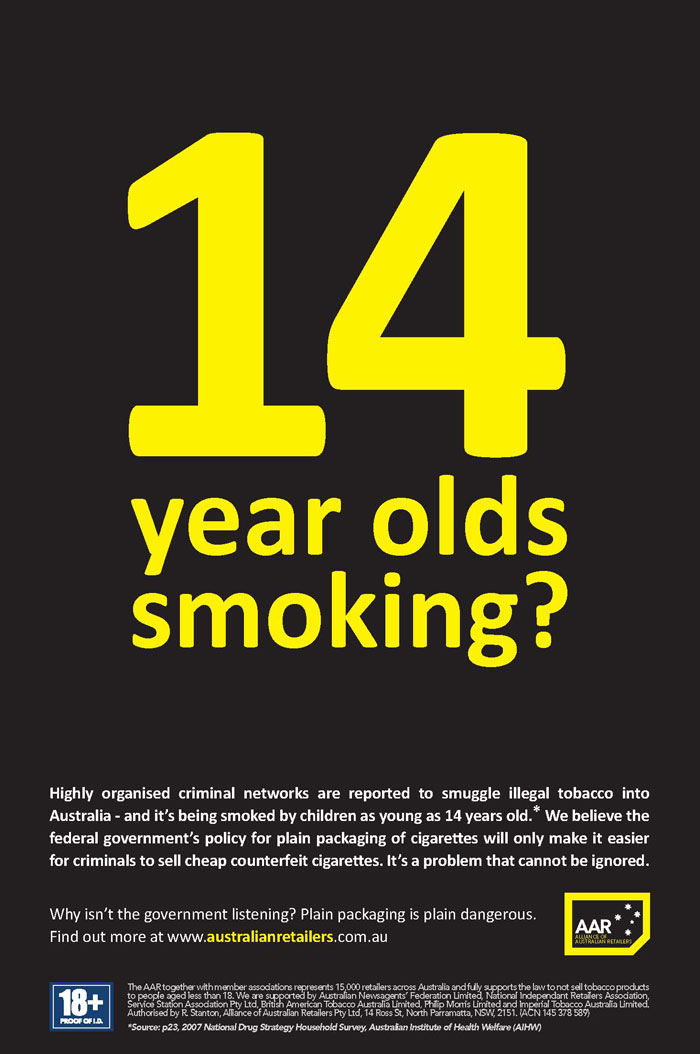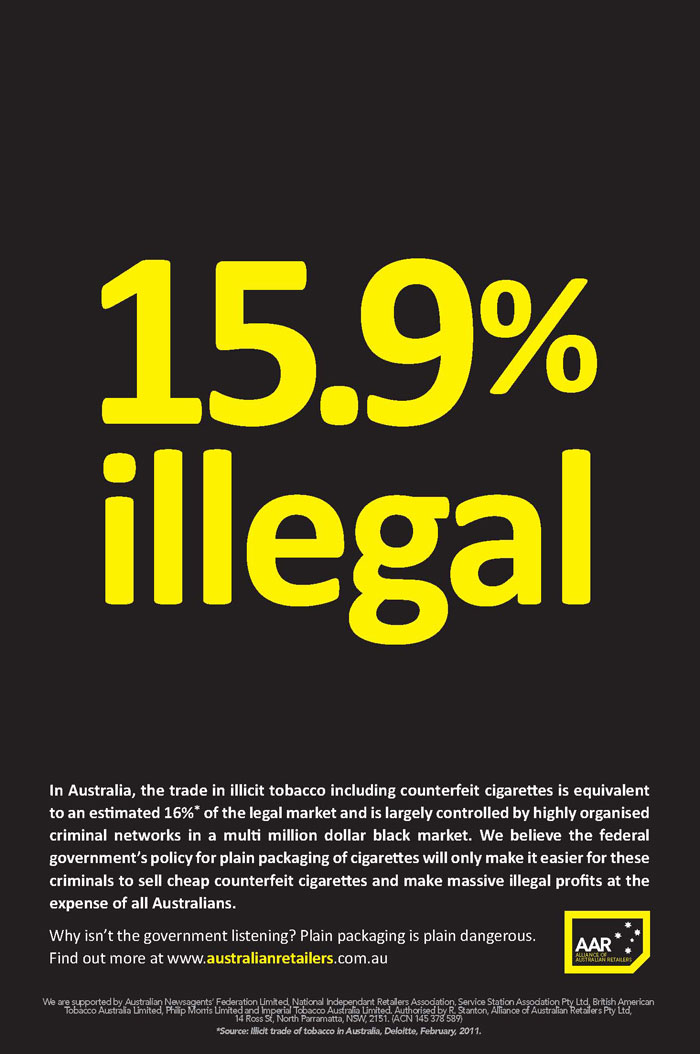On 29 April 2010, in what was heralded as a new benchmark in global leadership for tobacco control,1 the Australian Government announced that it would be developing legislation to introduce mandatory plain packaging of tobacco products in 2012.2 The announcement was part of the Government's response to the National Preventative Health Taskforce which recommended a range of initiatives to reduce tobacco smoking, under 11 key action areas. Recommendation 5.2.1 called for the Government to end promotion of tobacco products through package design.3 It also followed consideration by the Senate Community Affairs Committee of a private member's bill to mandate plain packaging brought forward by Senator Steve Fielding.4
The Australian Government's response to the national Preventative Health Taskforce recommendations2 specified that the intent of the legislation, would be to:
- increase the noticeability, recall and impact of health warning messages
- reduce the ability of packaging to mislead consumers to believe that some products may be less harmful than others
- reduce the attractiveness of the tobacco product, for both adults and children
- reduce the appeal and desirability of smoking generally.
On 7 April 2011, the Australian Government released a consultation paper5 and draft exposure legislation6 prior to introduction of the bill in the Australian Parliament on 6 July 2011.7 Extensive research was undertaken to determine the optimal specifications for packaging and warnings.8
11A.2.1 Health sector response to proposed legislation
The Australian Government's announcement about its intention to introduce plain packaging received overwhelming support from the health sector, with spokespeople describing the announcement as 'the most important national development in tobacco control since tobacco advertising was banned in the 90s’9 and commenting that it was 'difficult to exaggerate the importance' of such reforms.1, 10
11A.2.2 Financial market response
While health groups and experts praised the move, financial markets appeared to view the legislation as a big risk for industry profitability. Investment bank Citigroup, immediately issued a statement expressing the view that plain packaging was the 'biggest regulatory threat to the industry, as packaging is the most important way tobacco companies have to communicate with the consumer and differentiate their products.'11
11A.2.3 Response from retail groups
During the Australian federal election campaign in August 2010 a newly formed retail sector organisation, the Alliance of Australian Retailers, launched a counter mass-media campaign with the goal of stopping the plain packaging legislation.12 Advertisements featuring portrayals of concerned retailers saying that plain packaging would not work and would damage their business appeared nationally in newspapers, on television and radio.



Days after the launch of the campaign, major retailers withdrew their support. The Australian Association of Convenience Stores (AACS) withdrew its support after being forced to do so by the national grocery retailer, Coles. Coles, which chairs the board of the AACS, forced the board to withdraw the retail group and its members, including Caltex, Shell and BP, from the campaign, after being misled on the nature of the advertisements.13 Woolworths revoked its membership to the AACS over the campaign and demanded that its $15 000 in annual fees be returned.14
Health groups responded to the media campaign by placing a national newspaper advertisement of their own (figure 11A.2) and filing a complaint to the Australian Competition and Consumer Commission based on the misleading nature of the Alliance of Australian Retailers advertisements.15 Despite the media campaign, the Australian Government remained firmly committed to the policy.
On the 30 August 2010, the Alliance of Australian Retailers' website appeared to have been hacked. As reported by Crikey, the Alliance website was changed to read:
'In the interest of public health and aligning with society's values, we have decided to end this campaign. All Australian Retailers operate in mixed communities, and we believe the greater good of the non-smoking majority is worth more than that of the smoking minority.
'Current smokers will continue to smoke regardless of packaging. We refuse to give incentive to those that don't smoke in any form whatsoever—thus we have ended our campaign against plain packaging.'16
On 10 September 2010, Australian Broadcasting Corporation television program Lateline revealed, using leaked internal documents, e-mails and contracts, the full extent of tobacco industry influence on the Alliance of Australian Retailers campaign.17 On the day the alliance was formed it received funds from Imperial Tobacco Australia ($1 million), British American Tobacco Australia ($2.2 million) and Philip Morris ($2.1 million). It was further revealed that in May, before the formation of the alliance, Philip Morris' Australian corporate affairs manager, Chris Argent, was seeking advice from the lobbying and public relations firm, the Civic Group. Philip Morris was seeking advice and assistance for a campaign to stop plain packaging laws during the federal election.
Source: https://bit.ly/2OHdIoE
The Victorian Health Promotion Foundation (VicHealth) and the Public Health Association of Australia responded to the revelations by calling on the Australian Government to legislate for complete bans on all tobacco industry advertising and to force tobacco companies to release full details of lobbying, political donations and marketing plans and budgets.18
A survey of 2,101 Victorians released in March 2011 found that the Alliance of Australian Retailers campaign failed to persuade people that plain packaging would not be effective, with 86.2% saying that it made no difference to their views about plain packaging and 8.4% of respondents claiming that the advertisement increased their support.19
11A.2.4 Direct response by tobacco companies
Imperial Tobacco Australia
Imperial Tobacco Australia stated at the time of the Government's announcement that it would 'make every effort to protect its brands and associated intellectual property and including, if necessary, take legal action',20 and repeated this position on the release of the draft legislation.
Imperial Tobacco, whose brands include Peter Stuyvesant and Gauloises, said it would 'robustly challenge' the move, which it described as 'disproportionate and misguided'.
'Plain packaging has not been introduced in any country in the world and there is no evidence to support the government's claim that this will reduce smoking,' the company said in a statement.21
Philip Morris International
Presumably in anticipation of the legislation, Philip Morris International launched an entire website dedicated to plain packaging months prior to the announcement. The website featured video interviews with retailers from Australia and the United Kingdom, an animated clip on why plain packaging will fail, and pages promoting the views that plain packaging will not work, violates trademark rights and will increase illicit trade. In response to the release of draft legislation, Chris Argent, a spokesman for Philip Morris told AAP that plain packaging would fuel the illicit trade in tobacco products:
'We'll continue to oppose plain packaging in every way possible because of those serious issues that the government hasn't taken into account when pursuing this policy.'
Chris Argent, Philip Morris 2010 21
British American Tobacco
British American Tobacco's London-based website also included a position statement on plain packaging. In addition to arguing that the measure would not be effective, British American Tobacco claimed:
'Generic packaging would make it harder to prevent smuggled and counterfeit products entering a market, eroding government tax revenue and disrupting efforts to tackle the illegal trade in tobacco products that plays a significant role in funding international crime and terrorism.'
British American Tobacco website 22
In response to the Government's release of the exposure bill, British American Tobacco Australasia spokesperson Scott McIntyre stated that such legislation would result in claims for compensation that would be borne by taxpayers.23
Further details on industry reaction
For a list of media appearances and lobbying activities by tobacco industry representatives related to plain packaging, see timeline prepared by ASH Australia and the University of Sydney. Extracts below:
14 June 2011: Story about the US Coalition the 'Emergency Committee for American Trade' on why they oppose plain packs (Dr Cal Cohen) ABC TV.
11 July 2011: Story about tobacco companies recruiting retailers to call politicians.
2 Sept 2011: Philip Morris using FOI laws to acquire information from researchers in the United Kingdom.
14 Oct 2011: BATA threatens to suspend supply of cigarettes if Australian implementation date not changed.
11 March 2012: London Economics consultancy publishes 'The role of packaging imagery on consumer preferences for experience goods: A consumer behavioural experiment' funded by Philip Morris. Suggests that 'packaging imagery is a source of information that helps consumers differentiate between alternative product characteristics'.
11A.2.5 Extensive requests for information under Freedom of Information legislation
On 21 October 2010, Australian Greens health spokesperson Senator Rachel Siewert revealed that the Senate Estimates Community Affairs Committee had been informed that an unnamed tobacco company had made at least 19 requests through Freedom of Information provisions for information about government deliberations on plain packaging going back to 1992.24 The then Minister for Health and Ageing the Hon Nicola Roxon MP later confirmed extensive requests by all three companies.25 Between April 2010 and February 2012, the Department of Health and Ageing dealt with 64 Freedom of Information requests. The cost of processing 10 requests from British American Tobacco Australia was estimated at $643 000.25
Relevant news and research
For recent news items and research on this topic, click here.(Last updated January 2021)
References
1. Freeman B and Chapman S. On ciggies, australia the world leader in public health reform. 2010; 30 Apr. Available from: http://www.crikey.com.au/2010/04/30/on-ciggies-australia-the-world-leader-in-public-health-reform/
2. Australian Government. Taking preventative action: Government's response to Australia: The healthiest country by 2020. 2010 Canberra: Department of Health and Ageing, 2010. Available from: http://webarchive.nla.gov.au/gov/20160923060300/http://www.preventativehealth.org.au/internet/preventativehealth/publishing.nsf/Content/national-preventative-health-strategy-1lp
3. Preventative Health Taskforce. Australia: The healthiest country by 2020. National preventative health strategy. Canberra: Commonwealth of Australia, 2009. Available from: http://webarchive.nla.gov.au/gov/20160923060300/http://www.preventativehealth.org.au/internet/preventativehealth/publishing.nsf/Content/national-preventative-health-strategy-1lp
4. Final report Plain Tobacco Packaging (Removing Branding from Cigarette Packs) Bill 2009. 2010; Available from: https://www.aph.gov.au/Parliamentary_Business/Bills_Legislation/Bills_Search_Results/Result?bId=s724.
5. Australian Government. Public consultation on plain packaging of tobacco products. Canberra: Department of Health and Ageing, 2011. Available from: http://www.health.gov.au/internet/main/publishing.nsf/Content/health_consultations_closed_2011.htm.
6. Tobacco Plain Packaging Bill 2011. 2011; Available from: http://parlinfo.aph.gov.au/parlInfo/search/display/display.w3p;query=Id%3A%22legislation%2Fbillhome%2Fr4613%22.
7. Nicola Roxon Minister for Health and Ageing. World's toughest anti-smoking laws released, Department of Health and Ageing, Editor 2011: Canberra. Available from: https://www.youtube.com/watch?v=8pcENBWfMyE
8. Gfk Blue Moon. Market research reports on tobacco plain packaging and graphic health warnings. Canberra: Department of Health and Ageing, 2011. Available from: http://www.health.gov.au/internet/main/publishing.nsf/Content/mr-plainpack.
9. Sweet M. Plain tobacco packs – 'draconian' or a massive win for public health?, Croakey (Crikey), Editor 2010: Sydney. Available from: http://blogs.crikey.com.au/croakey/2010/04/29/plain-tobacco-packs-draconian-or-a-massive-win-for-public-health/#comments.
10. Casben L. Tobacco companies rally against plain packaging. ABC News, 2010; 29 Apr. Available from: http://www.abc.net.au/news/stories/2010/04/29/2885343.htm?section=business
11. Smith P. Australia plans cigarette packet branding ban. Financial Times, 2010. Available from: https://www.ft.com/content/8bc35964-533c-11df-813e-00144feab49a
12. Lloyd P. Tobacco industry rejects plain packets. Lateline, Australian Broadcasting Corporation, 2010; Broadcast 4 August. Available from: http://www.abc.net.au/lateline/content/2010/s2972652.htm
13. Benson S. Coles pulls out of pro-cigarette campaign. The Daily Telegraph, 2010; 12 Sep. Available from: http://www.dailytelegraph.com.au/business/coles-pulls-out-of-pro-cigarette-campaign/story-e6frez7r-1225903660384
14. Benson S. Woolies pulls plug over ads. Daily Telegraph, 2010; 12 September 2010. Available from: http://www.dailytelegraph.com.au/election/woolies-pulls-plug-over-ads/story-fn5zm695-1225904675110
15. Anon. Smoking ad 'deceit'. The Age, 2010; 12 Sep. Available from: http://www.theage.com.au/federal-election/smoking-ad-deceit-20100813-1239o.html
16. Whittaker J. Smoking kills, says big tobacco on hacked plain packaging campaign site. Crikey, 2010; 12 Sept. Available from: http://www.crikey.com.au/2010/08/30/smoking-kills-says-big-tobacco-on-hacked-plain-packaging-campaign-site/
17. Lloyd P. The tobacco files. Lateline, Australian Broadcasting Corporation, 2010; Broadcast 12 Sep. Available from: http://www.abc.net.au/lateline/content/2010/s3008987.htm
18. VicHealth. Plain packaging campaign revealed as a farce on ABC's lateline, VicHealth, Editor 2010: Carlton. Available from: https://www.vichealth.vic.gov.au/media-and-resources/media-releases/plain-packaging-campaign-revealed-as-a-farce
19. Quit Victoria. Tobacco industry persuades people to support plain packaging of cigarettes, Cancer Council Victoria, Editor 2011: Melbourne. Available from: https://www.cancervic.org.au/about/media-releases/2011-media-releases/media-march-2011/aus-retail-alliance.html
20. Imperial Tobacco. Imperial Tobacco to defend its trademarks, 2010: Sydney.
21. Australian Associated Press. Tobacco giants oppose plain packaging. Business Spectator, 2011; 7 Apr.
22. Plain packaging. London: British American Tobacco 2010.
23. News on ABC. Scott McIntyre from British American Tobacco Australasia, plain packaging will cost taxpayers: BATA. 2011. Available from: http://www.youtube.com/watch?v=wEXH7mqEEWE
24. Rachel Siewert Australian Greens. Tobacco industry fight to undermine health initiatives uncovered, 2010: Canberra. Available from: https://rachel-siewert.greensmps.org.au/articles/tobacco-industry-fight-undermine-health-initiatives-uncovered
25. Community Affairs Legislation Committee. Official Committee Hansard Wedensday 15 February. Estimates Wed 15 February.Canberra: Commonwealth of Australia, 2012. Available from: http://parlinfo.aph.gov.au/parlInfo/download/committees/estimate/4c49d0f2-f9fb-47d6-9c15-f3211561297f/toc_pdf/Community%20Affairs%20Legislation%20Committee_2012_02_15_797_Official.pdf;fileType=application%2Fpdf#search=%22committees/estimate/4c49d0f2-f9fb-47d6-9c15-f3211561297f/0000%22.